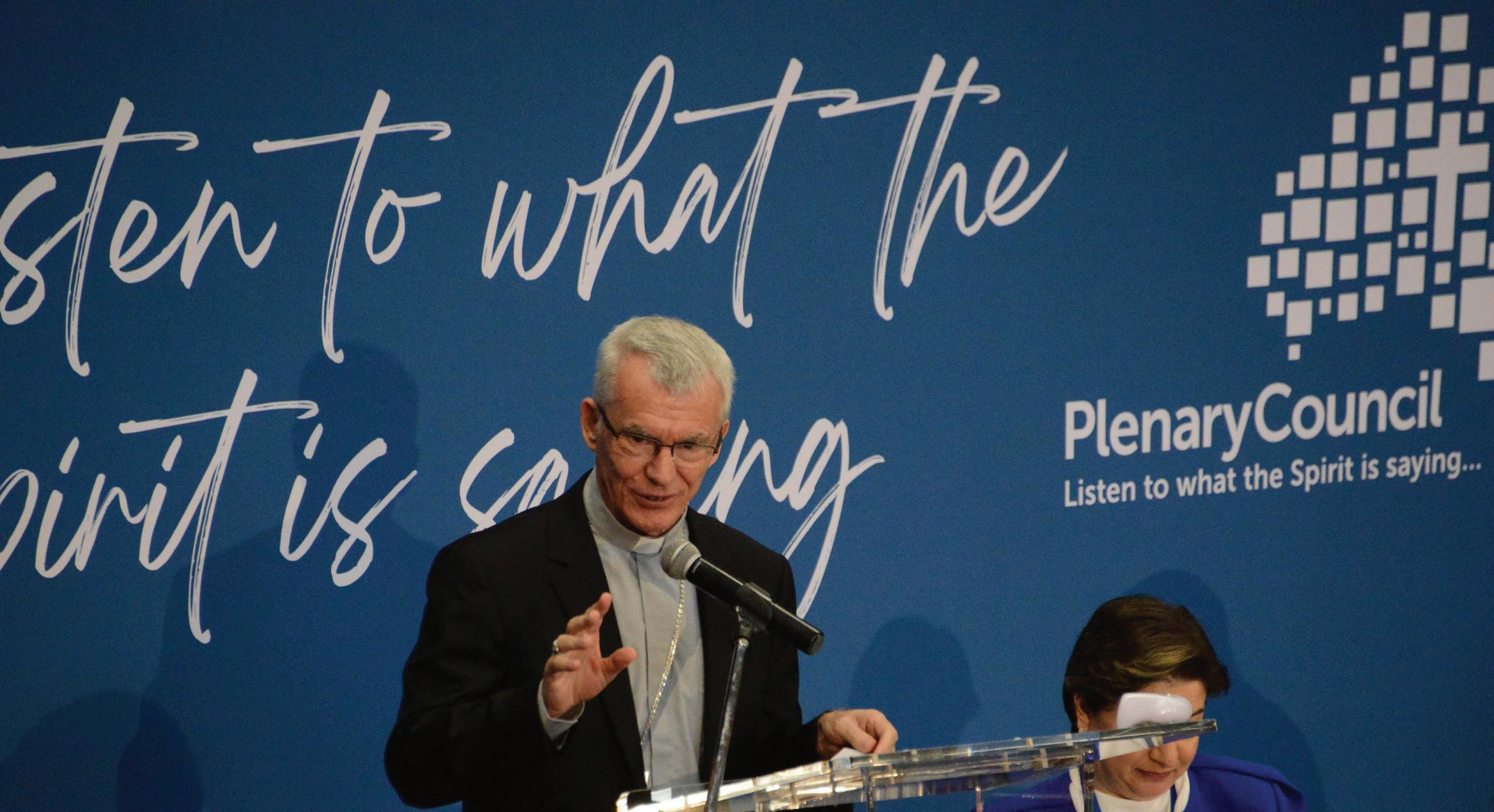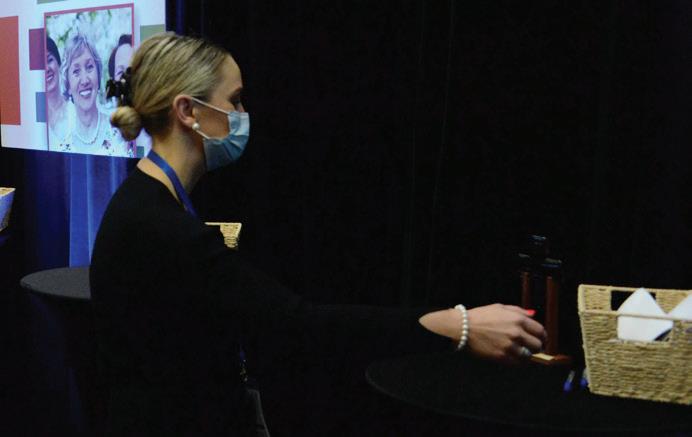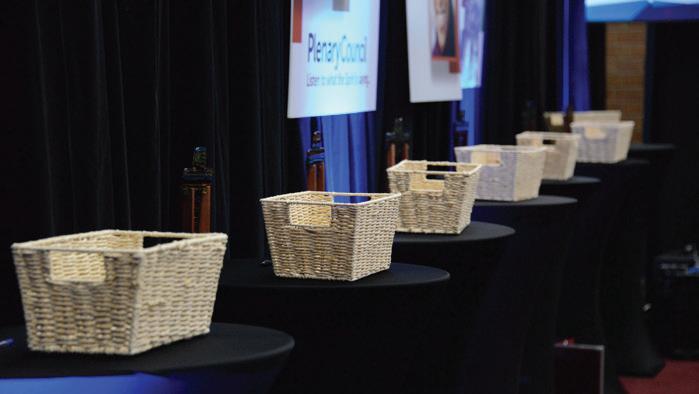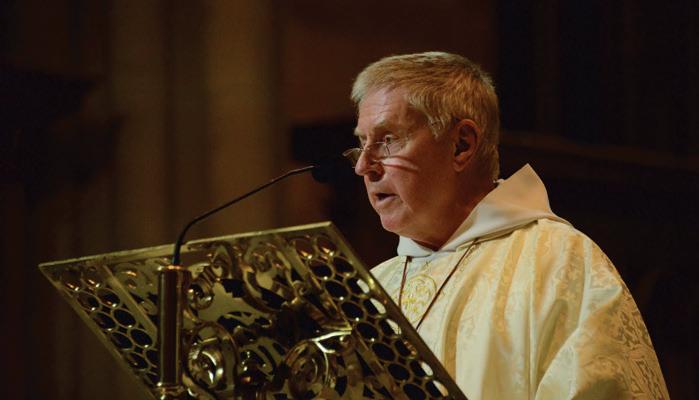

PLENARY COUNCIL SECOND ASSEMBLY: “CLING TO THE CROSS,” SAYS BISHOP MACBETH-GREEN
The Members of the Fifth Plenary Council of Australia were urged to “cling to the cross” and “ask the Holy Spirit to help us” as they commenced the Council’s Second Assembly on Sunday evening, 3 July 2022.
The opening Mass of the Second Assembly began with a Welcome to Country ceremony that included an apology to First Nations peoples on Aboriginal and Torres Strait Islander Sunday.
In his homily for the Mass, WilcanniaForbes Bishop Columba MacbethGreen OSPPE referred to the Aboriginal crosses provided to Plenary Council Members.
Holding up his own cross, he said it was a reminder “that we need to cling to the cross and ask the Holy Spirit to help us understand the role of the cross as the reason for our joy and our hope, that we can rejoice in the midst of maybe our tiredness”.
“It’s the antidote to the tiredness,” he said, after comparing the exile and struggles of the Israelites in the Mass’ first reading to the challenges facing the Church today.
He suggested that perhaps Aboriginal and Torres Strait Islander people understand this tiredness “in a way that most of us couldn’t”.
“There are a lot of people in the Church today who feel tired too,” he said.
“There have been profound changes they’ve seen in the Church and in society.
“Our Plenary Council could be, like the prophet Isaiah, a prophetic voice that communicates through the Church comfort, hope and encouragement to a tired people.”
The Apostolic Nuncio to Australia,

Archbishop Charles Balvo, was the Mass’s principal celebrant.
“We know that the Holy Father, Pope Francis, also walks with us,”
Archbishop Balvo said.
“It is also he who is inspiring us to walk the synodal way, to take Jesus, indeed, as our example.”
At the conclusion of his homily, Bishop Columba asked the Members to “entrust our Aboriginal and Torres Strait Islander peoples and the Members of the Plenary Council to our Mother Mary, who stood at the foot of the Cross under Jesus”.
“We might also ask for the prayers of Australia’s first saint who took the name ‘Mary of the Cross’, who loved God so much in the poor and the marginalised, and did so much to help them, that we might do likewise,” he said.
The Members have this week commenced the discernment of the more than 30 motions that have emerged at the end of a four-year journey, including a COVID-enforced delay.
The Members will use the Motions and Amendments document published last week as the basis of their conversations, leading to votes on the final motions across the coming days.
People from across the country have been sharing messages of support through the Plenary Council website, with many focusing on the need for Members to trust in the Holy Spirit about whom Bishop Macbeth-Green preached.
Follow the Second Assembly of the Plenary Council at www. plenarycouncil.catholic.org.au
Wilcannia-Forbes Bishop Columba Macbeth-Green OSPPE proclaims his homily during the Opening Mass of the Second Assembly, Sunday 3 July at Mary Mackillop Chapel, North Sydney. PHOTO: FIONA BASILE/ACBC.
PLENARY COUNCIL SECOND ASSEMBLY: WE MUST SPEAK
BOLDLY AND LISTEN HUMBLY, SAYS ARCHBISHOP COSTELLOE

At the Council’s opening session on Monday morning, the Members of the Fifth Plenary Council of Australia were invited to carry “a deep consciousness of who we are” as the People of God, called to discipleship in the Australian context. As President of the Plenary Council, Archbishop Timothy Costelloe SDB opened the first day of deliberations with an address to its Members, acknowledging the failure of the Church to live up to this calling.
“This week we will acknowledge again, in sorrow and in shame, the damage our failures have caused in the lives of many people,” he said. The challenge ahead means ensuring “that when people engage with the Church they experience healing, hope and safety: that they experience the compassion and mercy of God”. Looking ahead to the deliberations, during which Members will discuss and vote on more than 30 motions from the Motions and Amendments document, he admitted that things may not turn out as people planned.
“Cherished hopes, dreams and projects may not have been realised,
or not in the way we had hoped and presumed would be the case,” he said.
Such is the challenge of discernment.
“Who knows what will have to die for something new to spring to life?
“None of us is perfect and none of us I suspect is free from the tendency to presume that the way we see things must be right and must be God’s way and that therefore those who see things differently must be mistaken or not as wise and full of insight as we are.
“It is this reality,” he said, “of our giftedness and our frailty, which helps us understand why we must speak boldly, and listen humbly.
“We should not doubt that the Spirit, in spite of our weakness and frailty, has responded to our prayer over the course of our journey so far.
It is the Holy Spirit who will take the Council to a “new place” by the end of the week, and “into a future in which, through God’s grace, we can be the signs and bearers of God’s love for all people that the Lord is calling us, as his Church, to be”. Archbishop Costelloe also welcomed
those attending the Council as observers: Archbishop Charles Balvo, Apostolic Nuncio to Australia; Cardinal Charles Bo SDB, Archbishop of Yangon; Cardinal John Dew, Archbishop of Wellington; Rev. John Gilmore, President of the National Council of Churches in Australia; and Ross Castle from Catholic Church Insurance.
The opening session included a Welcome to Country and a traditional Aboriginal smoking ceremony, followed by a time of prayer and worship.
The topics under discernment today include “Reconciliation: Healing Wounds, Receiving Gifts”, looking at how Aboriginal and Torres Strait Islander peoples can fully contribute to the life of the Church.
Also under discernment is the topic of “Choosing Repentance –Seeking Healing”, looking at how the Church in Australia can respond more transparently and contritely to the sexual abuse crisis.
Follow the Second Assembly at: https://plenarycouncil.catholic. org.au/
Plenary Council President and Perth Archbishop Timothy Costelloe SDB opened the first day of deliberations with an address to its Members, acknowledging the failure of the Church to live up to this calling. PHOTO: FIONA BASILE/ACBC.
PLENARY COUNCIL SECOND ASSEMBLY: MEMBERS
CALLED TO A DEEPER DISCERNMENT

Members of the Plenary Council are being invited to spend additional time to discern after two motions did not achieve a qualified majority in voting that has taken place over the past 24 hours.
The outcomes of the consultative and deliberative votes for motions of parts 3 and 4 of the Motions and Amendments document published last week have been announced. They can be found on the Plenary Council’s Motions and Voting page on the Council’s website.
All four motions in part 3 of the document – entitled “Called by Christ – Sent Forth as Missionary Disciples” – achieved qualified majorities on both rounds of voting. Two-thirds of voters present must support a motion to achieve a qualified majority.
In part 4 of the document, entitled “Witnessing to the Equal Dignity of Women and Men”, one motion received a qualified majority among the consultative voters but fell just short of a qualified majority among deliberative voters. It therefore did not pass.
The other motion did not receive a qualified majority on either the consultative or the deliberative vote.
PLENARY COUNCIL SECOND ASSEMBLY: MEMBERS TO RECONSIDER TWO PLENARY COUNCIL MOTIONS

The Members of the Plenary Council have spent Wednesday afternoon working together to reconsider a pair of motions that were not passed earlier in the day. After the motions were rejected by
the directive vote of bishops, many women members left their seats and stood as a group at the edge of the assembly hall at St Mary’s Cathedral College. Some women members left the assembly hall in tears. The assembly program for the 277 assembly members was put on hold after the vote, which rejected motions aimed at ensuring women play a greater role in the Church and included support for admission of women to become Church deacons, if the Pope agreed.
During the scheduled lunch break
bishops held a closed-door meeting. However, in the first afternoon session, an overwhelming majority of Members backed a motion to reconsider the two motions from Part 4 of the Council’s Motions and Amendments document entitled “Witnessing to the Equal Dignity of Women and Men”.
At least half of the Council’s 277 Members had to support the motion to reconsider before it could proceed to a deliberative vote.
www.therecord.com.au
HOMILY URGES PLENARY COUNCIL MEMBERS TO SEEK UNITY

As Wednesday’s proceedings came to a close, Members of the Fifth Plenary Council of Australia were invited to remember the “saving unity” to which the Church is called. The Mass for the Church was offered at St Mary’s Cathedral, after a day
of further discernment following the results of the second rounds of voting. Details were published earlier in the day.
The Mass’ principal celebrant, Archbishop Mark Coleridge of Brisbane, opened by saying that at the end of such an “extraordinary” day, it was right to stand before the living God, who breathes life into “the chaos of the Church, and certainly the chaos of our sin”.
The homily was given by Fr Dominic Steele Hartmann OCSO, the abbot of Tarrawarra Abbey in Victoria. He emphasised that the unity of the Church is found in Christ.
If people are joined together in Christ, he said, they enter into the “saving unity” of the Church.
“We are called to unity, unity with Christ through our union with one another, and we are called to be united; we need to be one – this is the way of salvation,” Fr Hartman said.
This unity, he warned, does not mean “uniformity”.
“Our differences are a gift,” he said, “a gift that we in our Australian Church are called to embrace.
PHOTO: FIONA BASILE/ACBC.
PHOTO: FIONA BASILE/ACBC.
‘WAKE-UP CALL FOR US CATHOLICS’, SAYS ARCHBISHOP COSTELLOE

One of Australia’s most powerful Catholics has described the church’s falling support as a “wake-up call” as the country’s most popular religion battles to balance its convictions with the realities of an increasingly secular nation.
Australian Catholic Bishops Conference president Timothy Costelloe said the church needed to be faithful to its core principles and believe in the “gifts” Catholicism has to offer, including a way to make sense of the world and the call to live life with integrity.
At the fifth Plenary Council in Sydney this week, Catholic leaders have moved to re-endorse the Uluru Statement from the Heart and issue an apology to survivors of abuse in a bid to make amends with groups it has historically wronged.
Yet the religion with 1.3 billion global followers is falling out of grace with Australians, with 40 per cent of the population identifying as having no religion and only 20 per cent identifying as Catholic, down from 22.6 per cent in 2016, according to

the latest census results.
“I think it’s a very clear indication to us of the direction our society is going,” Archbishop Costelloe said. “It’s not surprising but it’s a bit of a wake-up call to remind us we can’t be complacent.
“We know the way we understand the meaning of life and look at life is not shared by everybody; we do not want to impose it on anybody, but we do want to offer it. It is a gift we can bring to our ¬society but like any gift you can take it or leave it … we want to offer it as openly and as generously as we can.”
Archbishop Costelloe, who was recently appointed president and will officially assume the role next week, said the Plenary Council had spent much of this week debating what approach to take to claw back its diminishing flock.
“A lot of our discussions have been about this idea of the church being a church that goes out to people, meets them where they are, offers them the gift we bring and leaving it up to them to decide if they want
to take it up,” he said.
Archbishop Costelloe said he hoped that work on the Religious Discrimination Bill would resume under the new government, after the Morrison government was forced to shelve legislation when moderate Liberal MPs crossed the floor. “I certainly hope that (Anthony Albanese) will be faithful to the fact that both sides of politics have been publicly committed to taking this step,” he said.
“I am looking forward to a time when we won’t have to worry about our ability to be faithful to who we are or what we believe.”
Reaching across the aisle, Archbishop Costelloe also acknowledged the church’s “mixed history” with Indigenous people.
“The Catholic Church and other churches and organisations were part of the Stolen Generations disaster, but we are very committed … to the journey of reconciliation,” he said. The church is also seeking to make amends with abuse victims, reoffering an apology to those who suffered abuse at the hands of the clergy.
“It’s a work that never finishes; we’re very conscious this will be a part of the journey of the church from now on - the recognition of the terrible things that happened,” he said. “And commitment to make sure we’re doing everything to make sure the future looks very different to the past and a commitment to support the survivors of sexual abuse as they try to put their lives back together.”
After the US Supreme Court’s reversal of Roe v Wade sparked renewed debate on abortion rights, the church in Australia remains firm. “As Catholics we uphold that the child in the womb is a human being and has as much right to life as anyone else. That is our fundamental position.”


President of the Plenary Council Archbishop Timothy Costelloe in Sydney on Tuesday for the Australian Catholic Bishops Conference. PHOTO: FIONA BASILE/ACBC.
